|
|
|
Sort Order |
|
|
|
Items / Page
|
|
|
|
|
|
|
| Srl | Item |
| 1 |
ID:
189251


|
|
|
|
|
| Summary/Abstract |
Japan-South Korea relations have consistently been presented by International Relations scholars as a puzzle that confounds mainstream rationalist theories, which struggle to explain the consistent acrimony associated with the so-called ‘history problem’. While many scholars have, therefore, adopted conventional constructivist approaches to incorporate history into their analyses, such literature often neglects the processes of (re)construction of this social reality, thereby implicitly treating these negative sentiments as essentialised elements of Korean and Japanese culture/identity which cause certain foreign policies. Using the recent Japan-South Korea trade dispute as a case study, this article instead draws on critical constructivist/poststructuralist theory and discourse analytical methods to examine how the ‘history problem’ is produced and reproduced. It argues that dominant discourses of remembering in South Korea, which represent Japan as an unrepentant colonial aggressor, and of forgetting in Japan, which represent South Korea as emotional and irrational for dwelling on the past, act to (re)produce identities that clash in their attitudes to difficult history. While such foreign policy practices (re)produce dominant national identities, these identities also shape the bounds of which foreign policies are legitimate or imaginable. This mutually constitutive relationship between identity and foreign policy continually reproduces the ‘history problem’ in Japan-South Korea relations.
|
|
|
|
|
|
|
|
|
|
|
|
|
|
|
|
| 2 |
ID:
099794
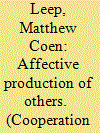

|
|
|
|
|
| Publication |
2010.
|
| Summary/Abstract |
IR scholars have recently turned to emotions to understand and explain events in world politics. Although this turn is appealing, most scholars have failed to critically examine the relationships between emotion, language, identity and foreign policy. This article aims to unpack these relationships. Drawing upon Sara Ahmed's notion of the 'emotionality of texts', this article explores how foreign policy may be an affective practice, which can be defined as a ritualized practice of discursively binding emotions to Others' identities and legitimating foreign policy through a discursive logic of feeling. In this way, identities are produced and policies are legitimated affectively. Neglecting the emotional narratives that constitute Self/Other relations leads to an insufficient understanding of emotion in global politics, an incomplete understanding of how identities emerge and matter as they do, and forecloses new alternatives of apprehending transformative ruptures and enduring patterns of Self/Other interaction. Through an analysis of United States policy towards the Israeli-Palestinian conflict, this article highlights the importance of emotion and affective practices in world politics.
|
|
|
|
|
|
|
|
|
|
|
|
|
|
|
|
| 3 |
ID:
178608


|
|
|
|
|
| Summary/Abstract |
The coup attempt of 2016 constitutes a major incision in contemporary Turkish politics. Focusing on the symbolic aspects of the AKP’s authoritarian rule in the direct aftermath of the coup attempt, this article offers a new conceptual framework to analyze three symbolic and discursive strategies that the government employed with the aim to normalize its exceptional and transformative measures: legitimation, narrativization and ritualization. It argues that these strategies contribute to the deepening of the AKP’s authoritarian regime formation and contends that the government’s actions are a reflection of the power struggle between the AKP and the Gülen movement.
|
|
|
|
|
|
|
|
|
|
|
|
|
|
|
|
| 4 |
ID:
172114
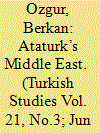

|
|
|
|
|
| Summary/Abstract |
The main argument of this paper is that Turkey had close relations with Middle Eastern states during the Atatürk period, which is contrary to the literature that claims the opposite because of Turkey’s Western-oriented ideology. The article asks why Turkey as a Western-oriented state sought to have close relations with Middle Eastern states. To answer this question, the article uses discourse analysis focusing on Middle Eastern leaders’ visits as represented in Turkish public discourse. Accordingly, it proposes two main answers. Firstly, the paper argues that the new state’s relations with Middle Eastern countries played an important role in legitimation of its Westernization projects in the eyes of its citizens. Secondly, the Turkish state marginalized rival political discourses, mainly Islamism, by proving that even Muslim majority countries wanted to imitate modern Turkey.
|
|
|
|
|
|
|
|
|
|
|
|
|
|
|
|
| 5 |
ID:
149735
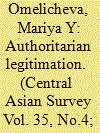

|
|
|
|
|
| Summary/Abstract |
What are the sources of authoritarian persistence in Central Asia? This study explores the argument that authoritarian regimes persist through effective authoritarian legitimation. Drawing on the theory and analysis of discourse, it develops an approach to authoritarian legitimation and examines discursive appeals to legitimacy by the Kazakh and Uzbek presidents. The study also assesses the effectiveness of the presidential discourses of legitimacy for public perception of the governing regimes in Kazakhstan and Uzbekistan. This research shows that by defining what constitutes legitimate power and presenting political rule as consistent with this definition, authoritarian governments can foster certain modes of reasoning and evaluation among citizens, and create possibilities for their acceptance of the regime as ‘right’ or ‘proper’.
|
|
|
|
|
|
|
|
|
|
|
|
|
|
|
|
| 6 |
ID:
189928
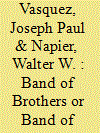

|
|
|
|
|
| Summary/Abstract |
Research suggests that marginalized groups can use military service to win greater governmental and social acceptance by using civic republican rhetoric, however, conditions in which claims-making rhetoric is coercive are underspecified. Because rhetorical effectiveness requires sympathetic ears, we examine the influence of (1) expectations and political efforts of marginalized group members seeking greater acceptance, (2) whether majority group economic status is outpacing marginalized groups seeking improved treatment, and (3) whether marginalized groups have influential military veterans from majority groups as allies. We apply these factors to explain the claims-making failure of German Jews following the First World War and the success of African Americans after the Second World War. From the African American case, we also conclude that military service led to greater socio-political inclusion and rights based on development of future political actors through leadership development processes and inter-group contact, especially regarding Presidents Truman and Eisenhower.
|
|
|
|
|
|
|
|
|
|
|
|
|
|
|
|
| 7 |
ID:
182999
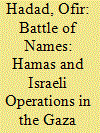

|
|
|
|
|
| Summary/Abstract |
This paper addresses the phenomenon of military operation-naming, that is, the act of giving names to war practices. Based on the four strategies of War Normalizing Discourse theory, I argue that, like nation-states, violent non-state actors also use the tool of naming to disseminate their wartime perceptions and mobilize public opinion for their own interests. Moreover, I argue that in its war-naming efforts the violent non-state actor seeks to defy and undermine the official names of its enemy state, using its own names to expand the physical battlefield to other fields of war and to present itself as an equal and legitimate player. To establish the above arguments, the article presents the case study of Hamas—specifically, the movement’s naming of rounds of fighting against Israel since the beginning of its rule in the Gaza Strip in 2007.
|
|
|
|
|
|
|
|
|
|
|
|
|
|
|
|
| 8 |
ID:
120326
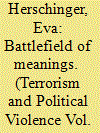

|
|
|
|
|
| Publication |
2013.
|
| Summary/Abstract |
For nearly forty years, debates on a definition of international terrorism as part of a comprehensive convention have been preoccupying the United Nations. This article challenges conventional approaches referring to divergences in national interests and preferences, or to institutional constraints and national legal traditions, to explain why no definition has been agreed upon. It analyzes the inconclusive debates from a critical perspective and argues that the continuous search for a definition can be understood through the prism of collective identity struggles: the desire to define terrorism is not only the desire to give a precise content to terrorism and, thereby, create the identity of an Other. It is also the desire to create a collective identity, a "Self," representing and uniting those who oppose terrorism. By applying a discursive understanding of collective identity construction to analyze the UN debates, the article elucidates how strongly the definition of terrorism hinders a common understanding among those who are opposing terrorism. Thereby, the analysis highlights that the demonization of terrorism foremost impedes a homogeneous understanding of a collective Self, ready to confront and define terrorism in the first place.
|
|
|
|
|
|
|
|
|
|
|
|
|
|
|
|
| 9 |
ID:
107960
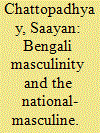

|
|
|
|
|
| Publication |
2011.
|
| Summary/Abstract |
This article examines how Bengali masculinity has been negotiated between national and ethnic/local notions of identity and suggests a new way of understanding this issue. Within the specific historiography of Bengali masculinity, concerns regarding physical strength, courage and virility of the Bengali male have been central tropes, challenged by the colonially constructed stereotype of the effeminate Bengali. The present article maps mainly nineteenth century discourses regarding Bengali masculinity and focuses on one particular strategy of three, namely, construction of a mode of mythic-historical discourse to reclaim a supposedly more masculine past for Bengali men. This suggests the notion of national-masculine as a gendered materialisation of the compensatory agency of Bengali masculinity. Shown to occur through the articulation of buddhibal in contrast with bahubal that negotiates with the hegemonic national-masculine, this throws new light on the emerging prominence of the bhadralok concept of a sophisticated Bengali gentleman.
|
|
|
|
|
|
|
|
|
|
|
|
|
|
|
|
| 10 |
ID:
177207
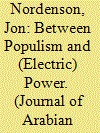

|
|
|
|
|
| Summary/Abstract |
Kuwait faces the double challenge of potentially destabilising effects of climate change as well as a changing international energy market in favour of renewables that may threaten the foundation of the oil-based economies dominating the region. Both these challenges point to the need for a transition towards more renewable energy sources and not least more sustainable patterns of energy consumption –– a transition that will be demanding for state and society alike. A successful green shift depends on a certain level of popular support or acceptance, yet it has proven difficult for the Kuwaiti government to gain support for their proposed solutions, and to reconcile the necessary changes with the existing relationship between state and society. This paper explores these challenges by studying public discourse concerning two contentious issues that are at the heart of the government’s economic reforms and of Kuwait’s planned efforts to cut GHG-emissions, namely fuel subsidy reform, and water and electricity conservation.
|
|
|
|
|
|
|
|
|
|
|
|
|
|
|
|
| 11 |
ID:
149877


|
|
|
|
|
| Summary/Abstract |
Energy policy literature tends to emphasise the impact of taxation on energy preference. However, the present case concerning extremely low acceptance of diesel cars in Japan could not be explained by taxation. As a possible factor, the paper sheds light upon discourse around the energy policy. The policy aimed to characterise diesel technology as emitting particulate matter and nitrogen oxide (NOx). The paper contributes to extending the existing understanding of the role of public policy by embracing the linguistic interactions complemented by visualisation.
|
|
|
|
|
|
|
|
|
|
|
|
|
|
|
|
| 12 |
ID:
161501
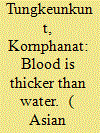

|
|
|
|
|
| Summary/Abstract |
In this article we examine how the phrase “China and Thailand are brothers” became the diplomatic discourse that both countries commonly use to articulate their cordial relations. First, we trace the historical contexts in which the discourse was constructed and how this discourse played a crucial role in encouraging overseas Chinese to integrate into Thai society in the early twentieth century. Second, we explain how the discourse provided insights for Thai and Chinese political elites relevant to the transformation of their nations' foreign policies toward Sino-Thai normalization during the Cold War. We further demonstrate how the discourse has reinforced a certain perception of Sino-Thai relations since diplomatic normalization between the two countries. Finally, we suggest a rethinking of the implications of diplomatic discourse with Chinese characteristics to better understand China's relationship with foreign countries in general and with Thailand in particular.
|
|
|
|
|
|
|
|
|
|
|
|
|
|
|
|
| 13 |
ID:
170707
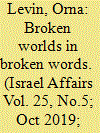

|
|
|
|
|
| Summary/Abstract |
This article addresses an unstudied literary discourse pattern in Israeli literature, which it terms an ‘empty discourse’ on Israeli wars, suggesting that they have become a simultaneously absent and present theme in Israeli literature. The analysis is based on Wittgenstein’s philosophy of language, which serves to explain the mutual influence between the reality of war and war literature. Based on the literary analysis presented, the article suggests a wider typology for examining this issue in contemporary Israeli literature published after the 2006 Lebanon War.
|
|
|
|
|
|
|
|
|
|
|
|
|
|
|
|
| 14 |
ID:
175149
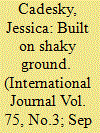

|
|
|
|
|
| Summary/Abstract |
In October 2017, Canada launched its Feminist International Assistance Policy (FIAP). While Canada’s explicit use of the words “feminist” and “feminism” may be refreshing, critical questions on the FIAP’s interpretation and application of these concepts remain. These challenges are not unique to the FIAP. Rather, the central weaknesses of the FIAP can be seen as symptomatic of several endemic challenges that persist in the current policies and practices that seek to promote gender equality in the developing world and beyond. This article presents the theoretical and conceptual lineage that has informed the FIAP, drawing from challenges present within literature on security, gender equality, and gender mainstreaming. Three main shortcomings relevant to both the literature and the FIAP are explored: first, the assumptions and essentialization of “gender” to mean “women”; second, the frequent conflation of “gender equality” with “women’s empowerment”; and last, the paradox of gender, gender equality, and feminism being simultaneously over-politicized and depoliticized to suit prevailing policy environments, with particular implications for the global coronavirus pandemic, as well as impacts in fragile and conflict-affected states. This analysis sheds light on persistent challenges in feminist foreign policymaking and offers insights for the development of Canada’s White Paper on feminist foreign policy.
|
|
|
|
|
|
|
|
|
|
|
|
|
|
|
|
| 15 |
ID:
156530
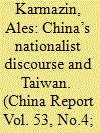

|
|
|
|
|
| Summary/Abstract |
This article focuses on the role and position of Chinese nationalism in the China–Taiwan relationship. Through discourse analysis, it aims to contend with the frequently presented picture in the literature on Chinese nationalism, that is, that nationalism in China is (almost) omnipresent and omnipotent. In the article, nationalism is presented as a broad but nuanced phenomenon. By its very nature, nationalism is a multi-edged sword whose ‘edges’ have the potential to be positive and constructive in certain situations, as shown in China’s approach to Taiwan in which nationalism plays an enabling role in a relatively important way. However, the article reveals a hierarchy in the concepts upon which China’s official discourse is based. In doing so, it disentangles and separates the role of two key concepts—nationalism and sovereignty—which are generally seen as almost interchangeable. Ethics, morality and kinship in Chinese nationalism - as presented by China’s official discourse in the relation to Taiwan - are subordinated to the politics of sovereignty.
|
|
|
|
|
|
|
|
|
|
|
|
|
|
|
|
| 16 |
ID:
189506
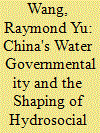

|
|
|
|
|
| Summary/Abstract |
This paper examines China's water governmentality in advancing the Lancang-Mekong Cooperation (LMC). It attends to how discourses, used as a political instrument, are framed, justified and contested in the reshaping of international hydrosocial territories. China's official and popular discourses present the LMC as promoting multilateral politics, economic benefits and social integration, while they obscure polarizing politics, external interventions and regional conflicts. Using strategies of positive publicity first, top-down communication and mutual empathy creation, these discourses aim to deflect attention away from controversies and geopolitics in the region to construct governable hydrosocial territories. However, in a transnational context where the Chinese state cannot unilaterally control geographical imaginaries, alternative discourses depict China as a “hydro-hegemon” that poses threats to downstream countries. The discursive dichotomy reflects multiple ontologies of water and power struggles in international river governance, bringing regional stability and sustainable development into question.
|
|
|
|
|
|
|
|
|
|
|
|
|
|
|
|
| 17 |
ID:
178804
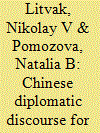

|
|
|
|
|
| Summary/Abstract |
New means of information warfare are now used to achieve new goals,
namely, cultural dominance and, as a result, control of other states and
peoples. In this respect, more and more attention has recently been paid
to the changing content and form of public communications by Chinese
politicians, including diplomats. The article studies the speeches of Chinese
ambassadors in key European countries (Germany, France, Great Britain, and
Italy) on two issues for which Chinese policy has lately drawn most of the Western criticism: the situation in Hong Kong and the COVID-19 pandemic.
To determine the dynamics of the diplomatic discourse, speeches made
between 2013 and mid-2020 were selected for analysis. The study is novel
in that it tests the comprehensive analysis methodology, in particular Michel
Foucault’s concept of discourse in combination with Jacques Derrida’s
concept of deconstruction. The analysis made points to the change in the
style of the Chinese diplomats’ communication towards its “mediatization,”
preference to appeal directly to the European media and general public,
doing so skillfully and with scientific substantiation.
|
|
|
|
|
|
|
|
|
|
|
|
|
|
|
|
| 18 |
ID:
188946
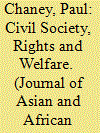

|
|
|
|
|
| Summary/Abstract |
This study examines Cambodia’s implementation of the United Nations Convention on the Rights of the Child (CRC). Corpus analysis of civil society organisations’ submissions to the United Nations Universal Periodic Review reveals a raft of CRC violations, including sexual abuse, trafficking and child labour. This is due to political and bureaucratic failings. The wider significance of this lies in underlining how the disjuncture between state and civil society underpins ongoing violations. Future progress depends on strengthened mobilisation yet increasing repression of civil society makes this unlikely. Accordingly, the prospects are bleak with children in Cambodia continuing to suffer widespread rights violations.
|
|
|
|
|
|
|
|
|
|
|
|
|
|
|
|
| 19 |
ID:
153313
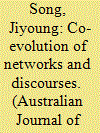

|
|
|
|
|
| Summary/Abstract |
This article uses an eclectic approach of network and discourse analyses to examine symbiotic relations between the formation of professional networks and the constitution of normative discourses in international affairs. Based on more than 2000 English and Korean mixed materials about the five most-mentioned North Korean defector-activists in the media in 1998–2015, and assisted by a computer-based content analysis tool, the author demonstrates how each of those five defector-activists has employed their endogenous identities to join the system of international human rights activism and offered legitimate narratives for the campaigns against North Korea, while forming transnational networks in South Korea, the USA and the UK. She argues that individuals’ endogenous identities and agency are critical for shaping normative discourses in international human rights activism against North Korea in the first instance, which then grow exponentially through transnational networks formed by individuals.
|
|
|
|
|
|
|
|
|
|
|
|
|
|
|
|
| 20 |
ID:
149426
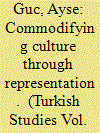

|
|
|
|
|
| Summary/Abstract |
This paper attempts to analyze two intertwined discourses on Mardin’s urban space that commodify its culture by representing it as an ideal place of living together. First is the official discourse which constructs an image for Mardin as a city of tolerance and belief, and second is the demotic discourse of the Mardinites which appropriates and contests this image. By describing these discourses, the paper intends to indicate the hiatus between the reality of Mardin’s locality and its representation. The paper argues that the discourses commodify Mardin’s cultural traits and strengthen local power relations by reproducing its urban space.
|
|
|
|
|
|
|
|
|
|
|
|
|
|
|
|
|
|
|
|
|